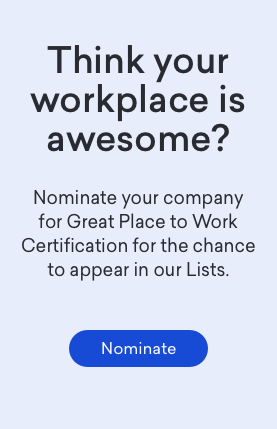There are lots of ways to shape culture, but in the end the proof of a good culture is in the performance of the organization.
We've got the "happy" culture stories – fun events, charismatic leaders, lots of energy and good times. And we have the more grim tales: bureaucracy, squabbling, fear. But what we know to be true is that any culture and every culture drives organizational performance. The best performing organizations know this, and they manage culture just as they do any other success factor.
Organizational culture is made up of the values and behaviors that define the work environment. We've all experienced a manager or co-worker who tells you "that's not how it's done here," or "you're enthusiastic but you'll learn, this place will shake that out of you." It's common to find companies with cultures of conformity, of mistrust and consequently low levels of performance and innovation. If we are lucky enough we have also experienced the company where managers and co-workers are welcoming and supportive of people who want to contribute to business success. At Great Place to Work® we celebrate and support those companies who try to create such cultures that are both people-oriented and performance-oriented.
The Culture Track of our 2016 Conference is showcasing some of these great, high-trust workplaces, and how leaders in these organizations work to preserve and strengthen their cultures.
Learn As You Grow
One of the biggest challenges for any company is maintaining a strong culture during periods of growth. New decision-making structures are needed and leaders need to find new ways to communicate with larger teams who may previously have experienced a higher level of availability of their top people. Software provider Yext has wrestled with the dilemma of leadership; how do you create opportunities for trust in a growing company? How much or how little do you share and still ensure transparency? How do you not dilute your culture as you grow? Over the past three years, for example, Yext has added over 250 employees, representing an employee growth rate of 275%, and achieved a revenue growth rate of 2,026%.
Amid this rapid expansion, Yext leaders have consciously tended to their culture. They have developed new processes and systems to streamline communication, created onboarding programs to make sure new hires are rapidly prepared to succeed, and developed organizational structures to ensure the company's values remain an anchor for the culture. Great workplaces create opportunities for leadership to communicate with the workforce and be transparent in their decisions, even during growth. Doing so helps save employees from expending their energy trying to decipher management's intentions, allowing them to focus on the job at hand safe in the knowledge that they are secure and valued.
Culture and Multiple Generations
Another culture dilemma companies face these days is fostering a workplace environment that works for people of different generations. Research suggests that the most important feature of a job for Millennials is feeling a sense of purpose and family in their jobs. Millennials also tend to prize work-life balance and a measure of power in the organization. How do you strike that balance in organizations between older employees and the up-and-coming workforce? Biotechnology firm Regeneron has tackled the problem head on. Four of ten Regeneron employees are millennials, and Regeneron has not shied away from giving these younger workers the responsibility they frequently seek. Millennials have taken on highly-visible and key decision-making roles across the company. That is key to bringing to life one the core values: "That's the way we've always done it is the wrong answer."
Culture is Human
When you put people inside companies they are still people. Software company Centro gets this and focuses on the basic human needs: physiological, safety and security, belonging, esteem, and meaningful achievement. It also looks at connection and caring, especially from leaders. Some might call it soft, but Centro wisely understands that it needs to build a culture to meet basic needs in order for people to make great contributions.
Culture is tough but worth it!
Great workplaces will tell you that focusing on culture is not easy, not quick ... but essential to success, and the right thing to do. Culture is a system and like any system it shapes the choices and actions of people every day. When it comes to culture there is no other way but for people, starting with leaders, to look closely at themselves, every day, and be living examples of the kind of company they want to work for.
Jonathan Becker and Claire Murphy are Partner and Executive Culture Consultant, respectively, at Great Place to Work®.














